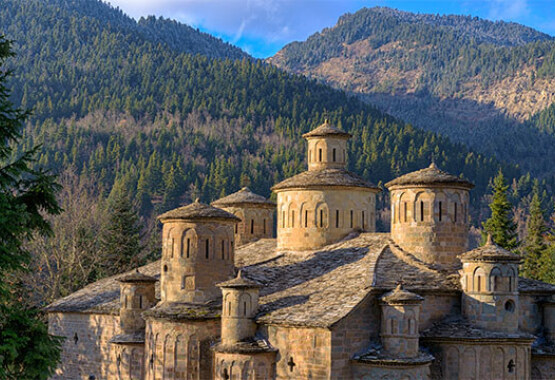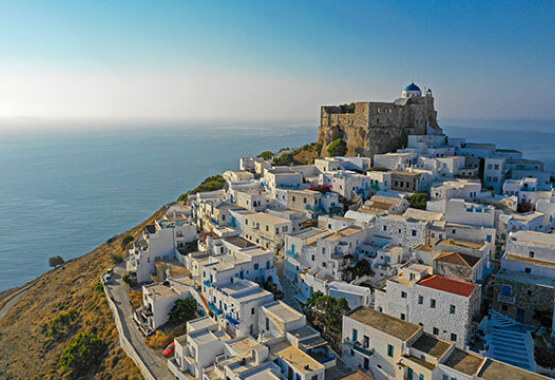
©P. Merakos
Gorgeous weather
Spring in Greece spans the months of March, April and May and brings lovely warm weather with bright blue skies and plenty of sunshine. Of course, weather conditions and temperature can vary in different parts of the country: The northern part of the country and areas at higher elevations are more likely to experience cold spells and rainy weather into spring, while the farther south you go, areas tend to experience summery weather earlier in the season.
Indicatively, the average daily high temperature ranges from 16.1°C in March to 25.1°C in May in Athens, from 17.1°C to 23.7°C in Crete, and from 16.1°C to 24°C in Santorini. Better yet, that’s coupled with a fabulous 10 hours of on average daily sunshine across the country by May! As summery as it may sound, however, spring is still spring, so make sure to pack some warmer clothes for the odd cold day or any late nights out.
Indicatively, the average daily high temperature ranges from 16.1°C in March to 25.1°C in May in Athens, from 17.1°C to 23.7°C in Crete, and from 16.1°C to 24°C in Santorini. Better yet, that’s coupled with a fabulous 10 hours of on average daily sunshine across the country by May! As summery as it may sound, however, spring is still spring, so make sure to pack some warmer clothes for the odd cold day or any late nights out.
©P. Merakos
The country’s in bloom!
While Greece’s hot and dry Mediterranean summers invoke the familiar image of golden hills and beaches set against the endless blue of the Aegean Sea, spring paints an altogether different picture. Nourished by the winter rains and warm spring sunshine, the landscape takes on the verdant hues of lush growth as all manner of plants burst into life and wildflowers add splashes of colour to the scene.
With its abundance of growth and vibrant colours, springtime in Greece is truly something to behold! And if you’ve only ever visited, or seen, Greece during the summer season, you’ll be amazed at how even familiar destinations can feel as if you’re laying eyes on them for the first time.
With its abundance of growth and vibrant colours, springtime in Greece is truly something to behold! And if you’ve only ever visited, or seen, Greece during the summer season, you’ll be amazed at how even familiar destinations can feel as if you’re laying eyes on them for the first time.
The (many) perks of avoiding the crowds
Travelling before peak tourism season kicks in comes with a host of benefits. From beaches to museums and archaeological sites, all the places on your to-visit list are likely to be less crowded; in other words, you’ll have your pick of surfside sunbeds and sunny spots by the pool, you can take your time enjoying the exhibits at Greece’s world-class museums, and you can finally snap that perfect selfie of just you and your favourite iconic destination.
By visiting Greece in spring, you’re also more likely to bag some savings thanks to earlier-in-the-season rates and fantastic deals both on travel to the country and accommodation when you arrive. And with fewer crowds meaning less stress on local communities and service staff, you’ll also enjoy friendlier and more authentic interaction with locals and a fantastic level of service, particularly in areas that tend to get very busy during the summer.
By visiting Greece in spring, you’re also more likely to bag some savings thanks to earlier-in-the-season rates and fantastic deals both on travel to the country and accommodation when you arrive. And with fewer crowds meaning less stress on local communities and service staff, you’ll also enjoy friendlier and more authentic interaction with locals and a fantastic level of service, particularly in areas that tend to get very busy during the summer.
Island bliss
Treat yourself to a whole new experience of the Greek islands when you visit in the springtime. The difference is particularly pronounced in the Cyclades archipelago, where islands renowned for their iconic whitewashed houses set against golden sands and bright blue seas and skies (including Mykonos, Paros, and Naxos) take on an altogether different appearance earlier in the year. Shades of green dominate as grass and shrubs spring to life and wildflowers bloom as far as the eye can see adding splashes of colour to the vibrant landscape.
From the Aegean to the Ionian and all the way south to Crete, this is a wonderful season to visit popular island destinations, enjoying a different side of them and revelling in true calm and relaxation, as you avoid the summer crowds. Do keep in mind that depending on the area, fewer visitors can also mean fewer transport links and fewer amenities open, so research your chosen destination and plan your itinerary, travel and stays in advance.
From the Aegean to the Ionian and all the way south to Crete, this is a wonderful season to visit popular island destinations, enjoying a different side of them and revelling in true calm and relaxation, as you avoid the summer crowds. Do keep in mind that depending on the area, fewer visitors can also mean fewer transport links and fewer amenities open, so research your chosen destination and plan your itinerary, travel and stays in advance.
©P. Merakos
Fantastic city breaks… and festivals!
If you’re craving a bit of sunshine and a long weekend away, the Greek cities of Athens and Thessaloniki make for fantastic city break destinations and offer a range of great events to visit during spring.
In Athens, take advantage of the fair weather to climb the Acropolis to the Parthenon, taking the scenic route to wander through the picturesque Plaka and Anafiotika neighbourhoods on the way. Alongside the city’s award-winning museums and exceptional tourist attractions, spring also gives you the opportunity to attend some of the city’s famous festivals, such as Athens Fashion Week in March-April and Athens Science Festival in April. May is an especially good month for avid festival goers to visit Athens, with events including the month-long Athens City Festival, Athens Digital Arts Festival, Athens Jazz, Athens Dance till Dawn (ADD), the Athens International Tattoo Convention, and the Onassis Fast Forward Festival of contemporary culture. And if you find the selection whetting your appetite, you’ll be delighted to hear that the Athens Street Food Festival is also held in May.
In Thessaloniki, explore the city in the brilliant spring sunshine to discover its fascinating history and multifaceted heritage that have shaped Thessaloniki’s unique culture and fantastic cuisine. Enjoy strolls in the sunshine along the city’s famous waterfront, visit its many landmarks and attractions and sample the wealth of culinary offerings. Spring is also a great season to get a taste of the city’s art and culture scene and visit some of its famous annual festivals including Thessaloniki International Documentary Festival (TiDF) in March, the In-Edit – Thessaloniki Edition international music documentary festival in April, and Thessaloniki Book Fair in May.
In Athens, take advantage of the fair weather to climb the Acropolis to the Parthenon, taking the scenic route to wander through the picturesque Plaka and Anafiotika neighbourhoods on the way. Alongside the city’s award-winning museums and exceptional tourist attractions, spring also gives you the opportunity to attend some of the city’s famous festivals, such as Athens Fashion Week in March-April and Athens Science Festival in April. May is an especially good month for avid festival goers to visit Athens, with events including the month-long Athens City Festival, Athens Digital Arts Festival, Athens Jazz, Athens Dance till Dawn (ADD), the Athens International Tattoo Convention, and the Onassis Fast Forward Festival of contemporary culture. And if you find the selection whetting your appetite, you’ll be delighted to hear that the Athens Street Food Festival is also held in May.
In Thessaloniki, explore the city in the brilliant spring sunshine to discover its fascinating history and multifaceted heritage that have shaped Thessaloniki’s unique culture and fantastic cuisine. Enjoy strolls in the sunshine along the city’s famous waterfront, visit its many landmarks and attractions and sample the wealth of culinary offerings. Spring is also a great season to get a taste of the city’s art and culture scene and visit some of its famous annual festivals including Thessaloniki International Documentary Festival (TiDF) in March, the In-Edit – Thessaloniki Edition international music documentary festival in April, and Thessaloniki Book Fair in May.
©FARAWAYFARERS
Fabulous off-the-beaten-path destinations
Greece is dotted with picture-perfect destinations waiting to be discovered, and they truly include something for everyone.
Feeling fit and competitive? Check out Spetsathlon, a multisport event (including swimming, cycling and triathlon races) on the island of Spetses in the Saronic archipelago. In the mood for romance? Enjoy a fairy tale stay in the medieval island fortress of Monemvasia, off the coast of the Peloponnese.
Longing for adventure in the great outdoors? Grab your backpack and get exploring at Tzoumerka National Park, in the Pindus Mountains of northwestern Greece. Or do you just want to sit back and relax with a good book and great a view? Then head to the charming seaside village of Syvota, on the Ionian coast of Epirus in western Greece.
Feeling fit and competitive? Check out Spetsathlon, a multisport event (including swimming, cycling and triathlon races) on the island of Spetses in the Saronic archipelago. In the mood for romance? Enjoy a fairy tale stay in the medieval island fortress of Monemvasia, off the coast of the Peloponnese.
Longing for adventure in the great outdoors? Grab your backpack and get exploring at Tzoumerka National Park, in the Pindus Mountains of northwestern Greece. Or do you just want to sit back and relax with a good book and great a view? Then head to the charming seaside village of Syvota, on the Ionian coast of Epirus in western Greece.
Greek Independence Day
Celebrated annually on 25 March, Greek Independence Day is a national holiday that commemorates the beginning of the Greek War of Independence in 1821. The day is a public holiday and it’s a great opportunity to witness the traditional celebrations, which include an armed forces parade in Athens and school flag parades across the country, as well as festivities all over Greece involving traditional costume, music and dance.
Greek Easter
Easter in Greece is a big deal, and it’s a fantastic opportunity to experience all kinds of Greek customs and traditions. Greeks love Easter (or Pascha as we like to call it) and the days around the holiday tend to be much busier than the rest of the spring season—but it’s absolutely worth it!
Greek Orthodox Easter is a moveable feast and usually takes place one to four weeks after Catholic Easter—in 2024, Easter Sunday in Greece is on 5 May. Traditionally, it involves a number of major ceremonies, most notable of which are the solemn Epitaphios procession on Good Friday and the (often quite spectacular) celebration of the Resurrection of Christ—Anastasi—that takes place at midnight on Holy Saturday.
There are many unique ways of celebrating Easter around the country. In the northern regions of Imathia, Kozani and Serres, girls in traditional costume take to the streets on Lazarus Saturday, holding effigies of Lazarus and going from door to door singing—a celebration that ends the next day with more singing and dancing in the town square. On the Ionian island of Corfu, tradition has local bands competing for which can best convey the sorrow of the Passion and the joy of the Resurrection, while on the nearby island of Lefkada, locals smash small clay pots on the morning of Holy Saturday, and keep shards as tokens to ward off mournful feelings. On the quaint island of Hydra, the Epitaphios procession heads to the beach and is carried into the sea, as a blessing to honour the island’s waters and its maritime heritage.
The Resurrection is an affair quite literally filled with light. Across Greece, people gather outside churches to light their candles with the holy light, but some places take it a step further. In Santorini, the thousands of lit candles and lanterns atop the caldera’s imposing cliffs create quite a breathtaking spectacle. In Leonidio, in the Peloponnese, locals release paper lanterns into the night sky. And the towns of Messini, also in the Peloponnese, and Vrontados, on the island of Chios, are known for traditional celebrations that resemble firework battles and which are said to date back to the earliest days of Greek independence.
Easter Sunday is a day of joy, and celebrations are held around the country in backyards and village squares alike, involving lots of delicious food and drink and traditional music and dancing.
Remember that Easter is a major public holiday in the country and a time when many Greeks take short breaks to the islands and the countryside. To ensure you enjoy the experience, be prepared for at least some crowds at key locations and events, double-check opening times for any attractions you want to visit, and make sure to book your travel and accommodation arrangements well ahead of time.
Greek Orthodox Easter is a moveable feast and usually takes place one to four weeks after Catholic Easter—in 2024, Easter Sunday in Greece is on 5 May. Traditionally, it involves a number of major ceremonies, most notable of which are the solemn Epitaphios procession on Good Friday and the (often quite spectacular) celebration of the Resurrection of Christ—Anastasi—that takes place at midnight on Holy Saturday.
There are many unique ways of celebrating Easter around the country. In the northern regions of Imathia, Kozani and Serres, girls in traditional costume take to the streets on Lazarus Saturday, holding effigies of Lazarus and going from door to door singing—a celebration that ends the next day with more singing and dancing in the town square. On the Ionian island of Corfu, tradition has local bands competing for which can best convey the sorrow of the Passion and the joy of the Resurrection, while on the nearby island of Lefkada, locals smash small clay pots on the morning of Holy Saturday, and keep shards as tokens to ward off mournful feelings. On the quaint island of Hydra, the Epitaphios procession heads to the beach and is carried into the sea, as a blessing to honour the island’s waters and its maritime heritage.
The Resurrection is an affair quite literally filled with light. Across Greece, people gather outside churches to light their candles with the holy light, but some places take it a step further. In Santorini, the thousands of lit candles and lanterns atop the caldera’s imposing cliffs create quite a breathtaking spectacle. In Leonidio, in the Peloponnese, locals release paper lanterns into the night sky. And the towns of Messini, also in the Peloponnese, and Vrontados, on the island of Chios, are known for traditional celebrations that resemble firework battles and which are said to date back to the earliest days of Greek independence.
Easter Sunday is a day of joy, and celebrations are held around the country in backyards and village squares alike, involving lots of delicious food and drink and traditional music and dancing.
Remember that Easter is a major public holiday in the country and a time when many Greeks take short breaks to the islands and the countryside. To ensure you enjoy the experience, be prepared for at least some crowds at key locations and events, double-check opening times for any attractions you want to visit, and make sure to book your travel and accommodation arrangements well ahead of time.
Amazing flavours
Springtime in Greece is a foodie’s dream come true. From simple seasonal bites to decadent feasts, there are plenty of opportunities to enjoy some of the nation’s favourite flavour-packed dishes plus a host of regional festive delicacies.
Spring menus in Greece are defined by seasonal availability and the culinary traditions around Easter. During Lent, the period of fasting leading up to Easter, Greeks traditionally abstain from certain foods, particularly meat and dairy. As a result, seasonal dishes during this period include a fantastic variety of vegetarian and vegan options that make use of the abundance of fresh produce and flavourful legumes. Some seasonal favourites worth trying are fava (which, interestingly, has nothing to do with fava beans), gemista (tomatoes stuffed with rice and herbs), artichokes à la polita, horta (wild greens in olive and lemon), braised aubergines, and briam (the Greek answer to ratatouille).
Easter Sunday marks the end of fasting with a day of feasting. Traditional Easter foods include spit-roast lamb, magiritsa (a traditional Greek Easter soup made with lamb offal, lettuce and an egg-lemon sauce), cheese pies, dolmathakia (vine leaves stuffed with meat and rice), crisp green salads, and, of course, red hard-boiled eggs that are enjoyed all day long as snacks as well as egg tapping. The Easter menu also includes plenty of sweet treats such as tsoureki (a type of sweet bread), Easter cookies, and galaktoboureko (a custard-filled pie made with syrupy phyllo pastry), as well as copious amounts of Greek coffee to keep everyone going.
Spring menus in Greece are defined by seasonal availability and the culinary traditions around Easter. During Lent, the period of fasting leading up to Easter, Greeks traditionally abstain from certain foods, particularly meat and dairy. As a result, seasonal dishes during this period include a fantastic variety of vegetarian and vegan options that make use of the abundance of fresh produce and flavourful legumes. Some seasonal favourites worth trying are fava (which, interestingly, has nothing to do with fava beans), gemista (tomatoes stuffed with rice and herbs), artichokes à la polita, horta (wild greens in olive and lemon), braised aubergines, and briam (the Greek answer to ratatouille).
Easter Sunday marks the end of fasting with a day of feasting. Traditional Easter foods include spit-roast lamb, magiritsa (a traditional Greek Easter soup made with lamb offal, lettuce and an egg-lemon sauce), cheese pies, dolmathakia (vine leaves stuffed with meat and rice), crisp green salads, and, of course, red hard-boiled eggs that are enjoyed all day long as snacks as well as egg tapping. The Easter menu also includes plenty of sweet treats such as tsoureki (a type of sweet bread), Easter cookies, and galaktoboureko (a custard-filled pie made with syrupy phyllo pastry), as well as copious amounts of Greek coffee to keep everyone going.
© P. Merakos
Free admission to top monuments and museums
Whether you want to check out the award-winning Acropolis Museum, admire the Parthenon or marvel at the ancient wonders of the Sanctuary of Delphi or the Palace of Knossos, you can enjoy a number of opportunities to gain free admission to key monuments, archaeological sites and museums around the country between March and May each year.
Specifically, entry to these sites is free to the public on: the first Sunday of March (actually the first Sunday of each month from 1 November to 31 March each year!)
Specifically, entry to these sites is free to the public on: the first Sunday of March (actually the first Sunday of each month from 1 November to 31 March each year!)
- 6 March – Melina Mercouri Day
- 25 March – Greek Independence Day
- 18 April – International Day for Monuments and Sites aka World Heritage Day
- 18 May – International Museum Day
Get Inspired
VIEW ALL

Pomegranate
Since antiquity, the pomegranate has symbolised plentifulness, youthfulness, fertility, and good luck. This delicious red fruit has always been held in high esteem for its richness in vitamins that boost our good health. According to a Greek tradition, a pomegranate must be broken in the morning of New Year’s Day on the house front door threshold to attract good luck for the entire year.

Beyond the Blue: Eco-Conscious Travel Through Greece’s Hidden Gems

Travelling Beyond Barriers

Star-studded Summer Nights
From Athens to the Greek islands and beyond, outdoor cinemas are a quintessential summer experience. Catch a movie under the stars and fall in love with this Greek summer must-do!
